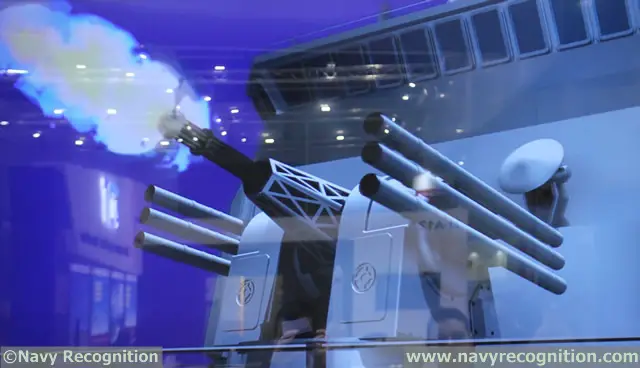
Posted on 03/09/2017 7:58:59 PM PST by sukhoi-30mki
During IDEX-NAVDEX, held from 19th to 23rd February in Abu Dhabi in the United Arab Emirates, Chinese company CSSC (China Shipbuilding Trading Co. Ltd.) unveiled the Type 730C dual gun and missile close in weapon system (CIWS). It combines the existing Type 730 seven-barrelled 30 mm Gatling gun system (Chinese Navy designation: H/PJ12) with 6x FL-3000N (Flying Leopard 3000 Naval missile, Chinese Navy designation: AJK-10 or HQ-10).

Type 730C dual gun and missile CIWS
According to a CSSC video, one set of fire control system uniformly manages missiles and ship borne guns to alternately hit incoming targets. SAM can work in conjunction with the guns to cope with two batches of incoming targets in order to enhance the capability of resisting saturation attacks.
Each 730C system comes with LR66 tracking radar and OC8 electro-optical tracker which can track and calculate two separate targets (fire on one, keep track of the other) at the same time. Contrary to exhisiting Type 730, these two sensors are not fitted on the CIWS on the new Type 730C variant (probably due to weight and EM interferences issues with the missiles). The whole system also comes with the SR64A search radar.
A single WCC-03 fire control console located in the ship CIC is used to control the Type 730C. There are also two associated cabinets: One for testing and training, the other being a "multifunctional exchange equipment".
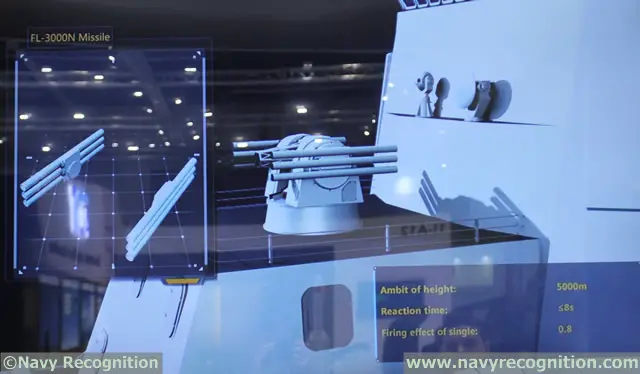
Type 730C Dual Gun and Missile CIWS 3Type 730C dual gun and missile CIWS
Type 730C performance:
As provided by CSSC:
Gun ammunition capacity: 2x drums of 500 rounds each.
Three modes of gun firing rate: 4000 rd/min - 2000 rd/min and 1000 rd/min
Gun effective range: 2500 meters against missile (using APDS), 3500 meters against aircraft (using HE) and 5000 meters against surface targets (using HE).
Interception range: 1400 to 150 meters against missiles; 3500 to 150 meters against aircraft.
The system reaction time between receiving whole ship target designation data and the gun pointing to the target ballistic point is less than 6 second for the LR66 tracking radar channel and less than 6.5 seconds for the OC8 electro-optical channel.
Target processing capability: about 32 targets.
Threat displaying capability: about 8 targets
Interception envelope of guns: 150 meters to 2500 meters
Interception envelope of missiles: 2000 meters to 8000 meters
LR66 Radar detecting range:
Against air target of 2m² RCS: about 16 Km
Against surface target: Visual Range
Against sea skimming target 0.1m² RCS: about 6 Km
OC8 Operational range:
Under the conditions of visibillity not less than 23.5 Km, environmental temperature not more than 25°c, relative humidity not more than 80%:
The operational range against 2m² RCS target is not less than 14Km and not less than 7Km against 0.1m² RCS target.
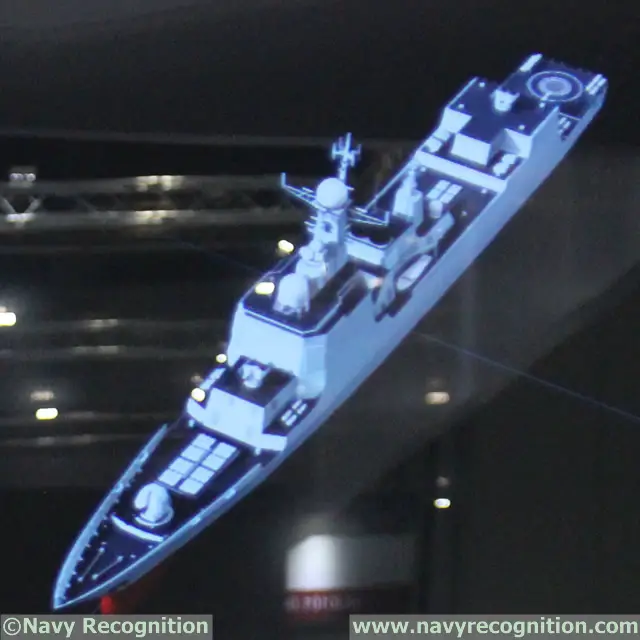
Type 730C Dual Gun and Missile CIWS 4A destroyer fitted with 2x Type 730C dual gun and missile CIWS
China can go to hell. You can’t image the fried rice. Screw China. Go TRUMP!!
I wonder if it works even as well as our 1980 era CIWS?
Those are computer-generated images, like you can make with AutoCAD or Solid Works.
If they had something real, I think they would be showing it, not some dumb CGI still shots.
I wonder that too. Interesting idea, but the CISW was speedy and simple. I’m thinking the missiles and their weight, and their infrastructure in the targeting module would slow it down the smallest bit.
I’m way out of my field here, but I would think a missiles module doing its thing at a distance, and CIWS up close working simultaneously, but not together in the same turret. And both of them fully independent of the other.
I’m probably being simple minded here. But it seems like installing 20mm in the same turret as your 5” guns. Both need to do different things at the same time.
But like I said, way outta my field.
Maybe modern computers fully overcome my thinking on the question and can manage both as a team.
that’s a model of a CIWS, not a CIWS. it’s a lot like their aircraft carrier that they didn’t build, and can’t recover aircraft.
The CIWS gun the system uses is very real and already deployed. The “new” part is the adding of six missiles to the CIWS mount.
How about video proof from 2012 that Liaoning (ex-Varyag) can actually launch and recover aircraft?
https://www.youtube.com/watch?v=-fXNIWsN4uo
Hate to tell you, but their carrier is looking a lot more functional than not.
As I said, the gun is very real - it appears at 1:02 in this video shot during Chinese war games back in 2013. It shows up a few times after that with more footage after 2:53.
https://www.youtube.com/watch?v=zCzlu4vsw1o
As to speed, the basic gun mount weights about the same as Phalanx (6 tonnes), Half a dozen missiles aren't going to add enough to slow it down that much.
What type of aircraft are those in the video?
Keep in mind that the missiles will be homing or guided missiles. The sights for the gun part of the system don’t really matter as the missiles really only need to be pointed in the general direction of the target and launched. The mount they’re on will have only minimal involvement beyond launch.
FYI, the Russians have been very successful with recent gun/missile combo systems. The Russian Tunguska (SA-19 Grison) self-propelled AA gun/missile system has a pretty good combat record.
Never mind.
From what I’ve read, the missiles are used to extend the range of the CIWS system - all CIWS systems have a relatively short range inherent to their smaller caliber rapid fire guns. The missiles are to be used to engage oncoming threats beyond the range of the gun and the gun fires when the threat enters its range if the missiles haven’t knocked it down.

Above picture is one launching from the Liaoning. It's a Chinese built navalized variant of the Russian Su-33. The Liaoning is a ski-jump carrier, but China just developed a CATOBAR capable version, the J-15A. As for the carrier's operational status... "In January 2017, the carrier Liaoning, returned to the South China Seas after its first deployment into the West Pacific, conducted a series of take-off and landing drills with its force of embarked J-15 fighters."
That’s kinda what I said
They took the original Type 730 and converted it into a land CIWS system, like we did the CIWS Ashore program. They called it the LD-2000 system. Then they put six TY-90 missiles on it, called it the LD-2000 Gai and apparently had some success with it. They're now backporting the missile capability back to the parent Type 730 naval CIWS.
Here's pictures of the LD-2000 Gai in the metal:
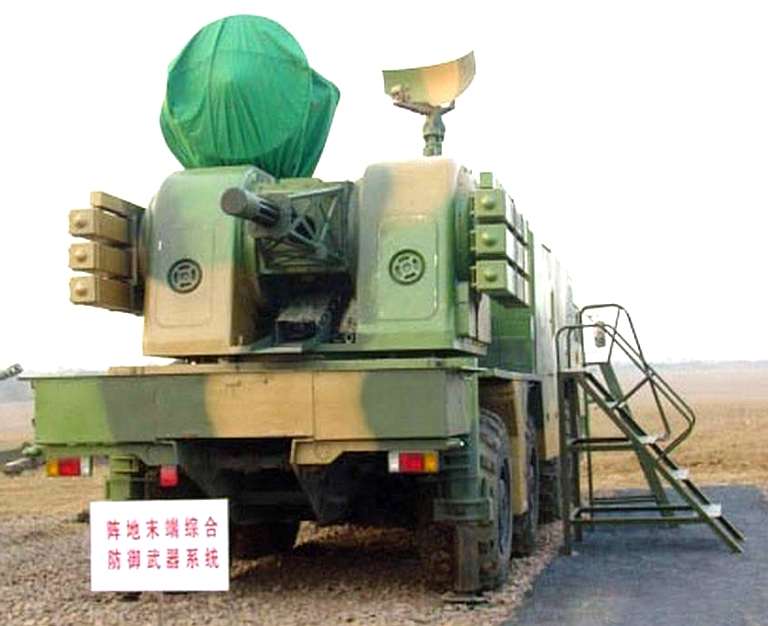
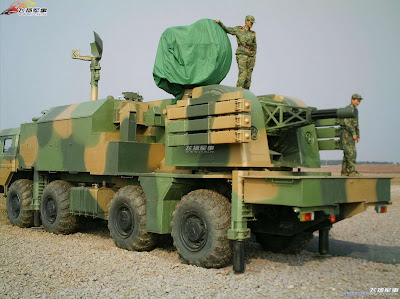
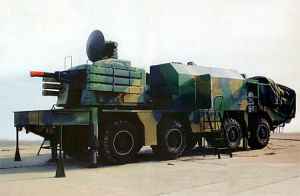
These pictures date back to 2011 when the UAE expressed interest in buying some.
Yeah, the real difference is the thing about the range - their doctrine doesn’t seem to be to fire the missiles if the gun is in range, which is what I was trying to elaborate on.
Shouldn’t the deck be curved upwards?
Disclaimer: Opinions posted on Free Republic are those of the individual posters and do not necessarily represent the opinion of Free Republic or its management. All materials posted herein are protected by copyright law and the exemption for fair use of copyrighted works.